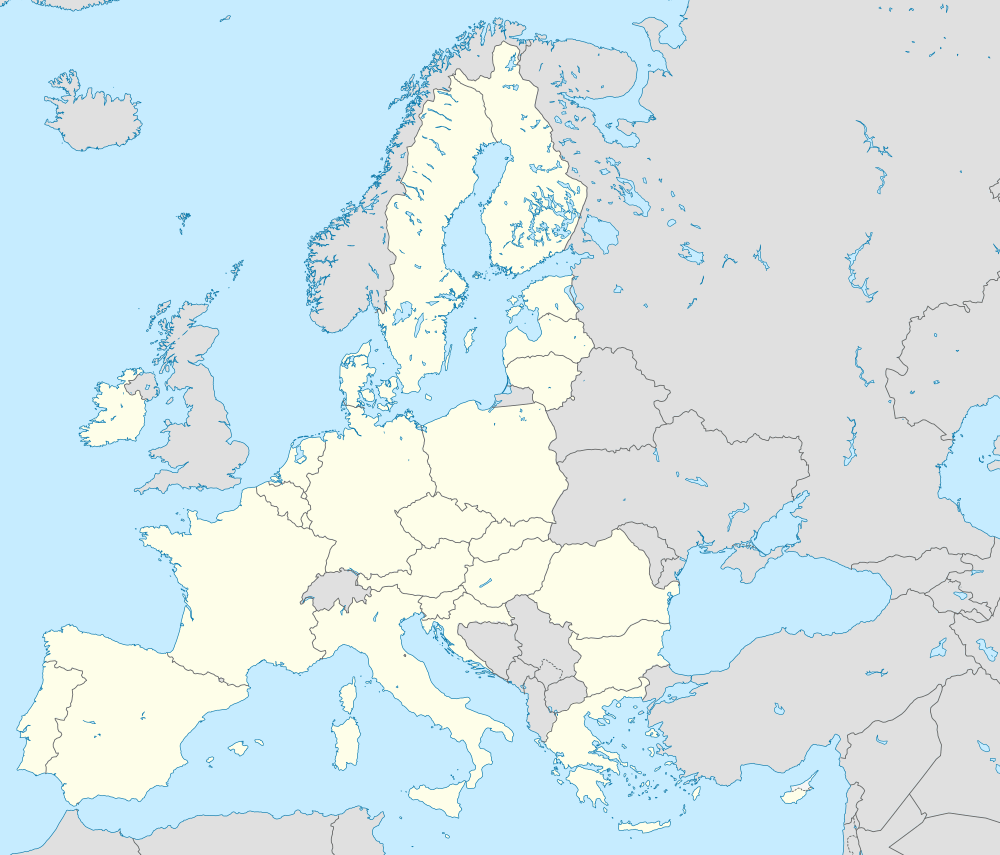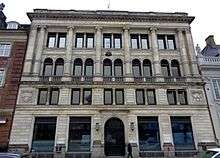European Environment Agency
The European Environment Agency (EEA) is the agency of the European Union (EU) which provides independent information on the environment.
 | |
| Agency overview | |
|---|---|
| Formed | 30 October 1993 |
| Jurisdiction | European Union |
| Headquarters | Copenhagen, Denmark 55°40′52″N 12°35′12″E |
| Agency executives |
|
| Key document | |
| Website | www |
| Map | |
 Copenhagen European Environment Agency (European Union) | |

Definition
The European Environment Agency (EEA) is the agency of the European Union (EU) which provides independent information on the environment. Its goal is to help those involved in developing, implementing and evaluating environmental policy, and to inform the general public.
Organization
The EEA was established by the European Economic Community (EEC) Regulation 1210/1990 (amended by EEC Regulation 933/1999 and EC Regulation 401/2009) and became operational in 1994, headquartered in Copenhagen, Denmark.
The agency is governed by a management board composed of representatives of the governments of its 33 member states, a European Commission representative and two scientists appointed by the European Parliament, assisted by a committee of scientists. The current Executive Director of the agency is Professor Hans Bruyninckx, who has been appointed for a five-year term. He is the successor of Professor Jacqueline McGlade.
Member countries
The member states of the union are members; however other states may become members of it by means of agreements concluded between them and the EU.
It was the first EU body to open its membership to the 13 candidate countries (pre-2004 enlargement).
The EEA has 33 member countries and six cooperating countries. The 33 member countries include the 27 European Union member states together with Iceland, Liechtenstein, Norway, Switzerland and Turkey.
Since Brexit in 2020, the UK is not a member of the EU anymore and therefore not a member state of the EEA
The six Western Balkan countries are cooperating countries: Albania, Bosnia and Herzegovina, Montenegro, North Macedonia, Serbia as well as Kosovo under the UN Security Council Resolution 1244/99.[1] These cooperation activities are integrated into Eionet and are supported by the EU under the "Instrument for Pre-Accession Assistance".
The EEA is an active member of the EPA Network.[2]
| EU Member countries | non-EU Member countries | Cooperating countries |
|---|---|---|
Reports
The European Environment Agency (EEA) reported in 2017 that climate-related extreme events accounted ca €400 billion ($430 billion) of economic losses in EEA area from 1980 to 2013, and were responsible for 85,000 deaths during 1980-2013.[4]
European environment information and observation network
The European environment information and observation network (Eionet) is a partnership network of the EEA and the countries. The EEA is responsible for developing the network and coordinating its activities. To do so, the EEA works closely together with national focal points (NFP´s), typically national environment agencies or environment ministries which are responsible for coordinating national networksof the National Reference Centres (NRCs) involving many institutions (about 350 in all).
Apart from the NFPs and NRCs, Eionet covers six European Topic Centres (ETCs) in the areas of air and climate change, biological diversity, climate change impacts, vulnerability and adaptation, water, land use and spatial information and analysis and sustainable consumption and production.
Annual discharge process
In February 2012, the European Parliament's Committee on Budgetary Control published a draft report, identifying areas of concern in the use of funds and its influence for the 2010 budget such as a 26% budget increase from 2009 to 2010 to €50 600 000.[5]:8 and questioned that maximum competition and value-for-money principles were honored in hiring, also possible fictitious employees.[5]:10
The EEA's Executive Director refuted allegations of irregularities in a public hearing.[6]
On 27 March 2012 Members of the European Parliament (MEPs) voted on the report[7] and commended the cooperation between the Agency and NGOs working in the environmental area. On 23 October 2012, the European Parliament voted and granted the discharge to the European Environment Agency for its 2010 budget.[8]
In April 2013, the MEPs voted and granted the discharge to the EEA for its 2011 budget.[9]
Executive directors
| Name | Nationality | Term(s) |
|---|---|---|
| Domingo Jiménez-Beltrán | 1994–2003 | |
| Jacqueline McGlade | 2003–2013 | |
| Hans Bruyninckx | 2013– |
International cooperation
In addition to its 33 members and six Balkan cooperating countries, the EEA also cooperates and fosters partnerships with its neighbours and other countries and regions, mostly in the context of the European Neighbourhood Policy:[10]
- EaP states: Belarus, Ukraine, Moldova, Armenia, Azerbaijan, Georgia
- UfM states: Algeria, Egypt, Israel, Jordan, Lebanon, Libya, Morocco, Palestinian Authority, Syria, Tunisia
- other ENPI states: Russia
- Central Asia states: Kazakhstan, Kyrgyzstan, Tajikistan, Turkmenistan, Uzbekistan
Additionally the EEA cooperates with multiple international organizations and the corresponding agencies of the following countries:
- United States of America (Environmental Protection Agency)
- Canada (Environment Canada)
- PR China (State Environmental Protection Administration)
Official languages
The 26 official languages used by the EEA are: Bulgarian, Czech, Croatian, Danish, German, Greek, English, Spanish, Estonian, Finnish, French, Hungarian, Icelandic, Italian, Lithuanian, Latvian, Malti, Dutch, Norwegian, Polish, Portuguese, Romanian, Slovak, Slovene, Swedish and Turkish.
See also
- Agencies of the European Union
- Citizen Science, cleanup projects that people can take part in.
- EU environmental policy
- List of atmospheric dispersion models
- List of environmental organizations
- Confederation of European Environmental Engineering Societies
- Coordination of Information on the Environment
- European Agency for Safety and Health at Work[11]
- Environment Agency
References
- Countries and Eionet, European Environment Agency, Retrieved on 24 July 2013.
- European Network of the Heads of Environment Protection Agencies.
- (under the UN Security Council Resolution 1244/99)
- Nina Chestney South, southeast face Europe's most adverse climate change impact: agency Reuters, 25 January 2017
- Draft Report on discharge on the implementation of the budget of the European Environment Agency for the financial year 2010 14 pages, 6 February 2012
- Valentina Pop EU agencies rebuked over spending 2 March 2012. EU Observer website.
- Agenda for March 27, 2011 meeting of the Committee on Budgetary Control.
- 2012/804/EU: Decision of the European Parliament of 23 October 2012 on discharge in respect of the implementation of the budget of the European Environment Agency for the financial year 2010, 20 December 2012, retrieved 13 May 2020
- European Parliament. (2013). 2011 discharge: European Environment Agency (P7_TA(2013)0144). Retrieved from http://www.europarl.europa.eu/document/activities/cont/201305/20130523ATT66610/20130523ATT66610EN.pdf
- "International Cooperation". eea.europa.eu. European Environment Agency. 22 July 2016. Retrieved 23 April 2017. (scroll down to "European Neighborhood Project")
- EU-OSHA.
External links
- European Environment Agency website
- European Topic Centre on Land Use and Spatial Information (ETC LUSI)
- European Topic Centre on Air and Climate Change(ETC/ACC)
- European Topic Centre on Biological Diversity(ETC/BD)
- Model Documentation System (MDS)
- The European Environment Agency's near real-time ozone map (ozoneweb)
- The European Climate Adaptation Platform Climate-ADAPT
- EnviroWindows
